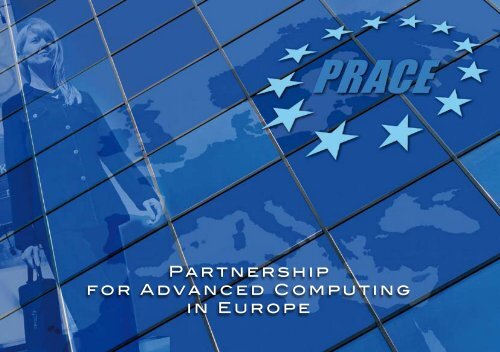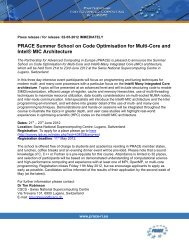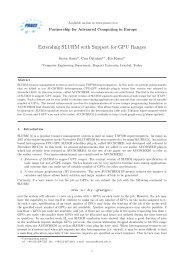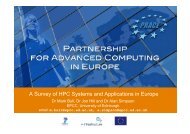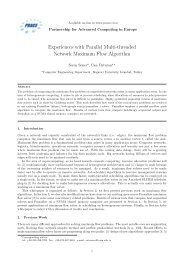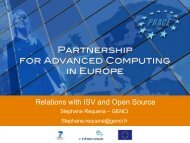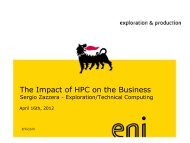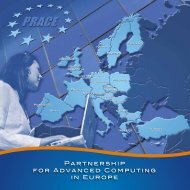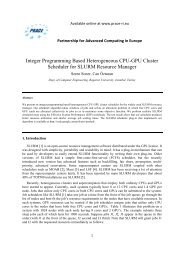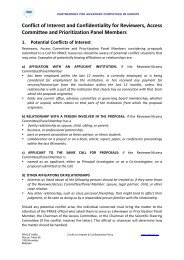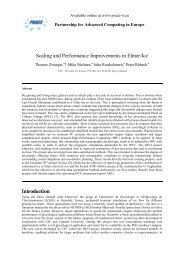PARTNERSHiP FOR ADVANCED COmPUTiNG iN EUROPE - prace
PARTNERSHiP FOR ADVANCED COmPUTiNG iN EUROPE - prace
PARTNERSHiP FOR ADVANCED COmPUTiNG iN EUROPE - prace
You also want an ePaper? Increase the reach of your titles
YUMPU automatically turns print PDFs into web optimized ePapers that Google loves.
Partnership<br />
for Advanced Computing<br />
in Europe
Towards a Permanent<br />
Research Infrastructure<br />
PRACE, the Partnership for Advanced Computing in Europe, is preparing<br />
the creation of a persistent, pan-European Research Infrastructure that<br />
will provide a leading HPC service to enable world-class science. The<br />
objective of the two year project is the completion of the necessary<br />
legal, administrative, and technical work that will allow the permanent<br />
Research Infrastructure to start operation in 2010.<br />
This infrastructure will be managed as a single<br />
European entity. European scientists and<br />
technologists will be provided with world-class<br />
leadership supercomputers with capabilities<br />
equal or better than those available in the USA<br />
and Japan. The service will be hosted by three<br />
to five Tier-0 level HPC centers. They build the<br />
apex of the European performance pyramid<br />
strengthened by regional and national supercomputing<br />
centers working in tight collaboration<br />
through grid technologies. In other words,<br />
the Partnership will become a unique entity of<br />
the pan-European HPC ecosystem. The infrastructure<br />
will be complemented with network<br />
and grid access, and the services required to<br />
enable applications.<br />
The objectives of the PRACE project are to:<br />
• Prepare the creation of a persistent,<br />
sustainable pan-European HPC service<br />
• Prepare the deployment of three to five<br />
Petaflop/s systems at different European<br />
sites<br />
• Define and establish a legal and<br />
organisational structure involving HPC<br />
centers, national funding agencies,<br />
and scientific user communities<br />
• Develop funding and usage models and<br />
establish a peer review process<br />
• Provide training for European scientists<br />
and create a permanent education<br />
programme
PRACE Research Infrastructure operable in 2010<br />
Achievements of the first project year<br />
PRACE has analysed close to 70 scientific<br />
applications from 24 systems – a snapshot of<br />
current European HPC usage – with the following<br />
objectives:<br />
• To map them to architecture specifications<br />
that were used to select the prototype systems<br />
• Select a subset which will serve as the nucleus<br />
of a benchmark suite to evaluate the prototypes<br />
and the future production systems<br />
• Port the applications to most prototypes<br />
• Optimise and scale suitable applications<br />
Based on the analysis of applications, PRACE<br />
has identified a comprehensive set of architectures<br />
and selected six related prototypes.<br />
The IBM BlueGene/P at FZJ, the CRAY XT5 at<br />
CSC, the IBM Power6 at SARA, and the IBM<br />
Cell at BSC have been installed and evaluated<br />
using synthetic benchmarks to measure system<br />
performance, I/O bandwidth and communication<br />
characteristics. The NEC SX-9 at HLRS<br />
has also been installed. The Intel components<br />
for HLRS’s hybrid system and the Intel systems<br />
at CEA and FZJ will be installed during 2009.<br />
The BULL systems at GENCI-CEA and FZJ will<br />
be installed during 2009.<br />
PRACE conducted a survey among Europe’s<br />
top HPC users about their training needs. Over<br />
90% stated that they need advanced training. In<br />
addition, this survey raised great interest in the<br />
USA and Asia where organisations requested<br />
to use it to identify their training needs. To teach<br />
programming for the prototype architectures,<br />
PRACE organised a Summer School in Stockholm<br />
and a Winter School in Athens including<br />
hands-on usage of the prototypes. These two<br />
events attracted already far more applicants<br />
than could be accommodated. In 2009 a series<br />
of code-porting workshops will be arranged.<br />
PRACE work in 2009<br />
PRACE will continue to optimise relevant scientific<br />
applications and important codes, evaluate<br />
and enhance libraries and tools, and finalise<br />
the benchmark suite. The prototype evaluation<br />
will be completed, resulting in a compendium<br />
describing the systems and their characteristics.<br />
This will be used to guide the procurement<br />
of the production systems.<br />
Access to the prototypes to port and evaluate<br />
applications can be requested following a lightweight<br />
process described at http://www.<strong>prace</strong>project.eu/prototype-access<br />
PRACE is evaluating components and technologies<br />
for future multi-petaflop/s systems. A set<br />
of nine prototypes will be installed at the following<br />
PRACE partner sites during 2009: CINECA,<br />
EPSRC-EPCC, ETHZ-CSCS, FZJ, GENCI-CEA,<br />
BAdW-LRZ, NCF-SARA, KTH and a joint prototype<br />
of BAdW-LRZ and GENCI-CINES.<br />
STRATOS, the PRACE advisory group on Strategic<br />
Technologies, was created as the initial<br />
step in a continuous process to watch for promising<br />
hardware and software components for<br />
use in future multi-petaflop/s systems and to<br />
foster collaborations with industry in order to increase<br />
HPC expertise in Europe.<br />
Equally important is the completion of the legal<br />
and administrative work in preparation for the<br />
pan-European legal entity. This includes: deciding<br />
the legal form; finalising the governance<br />
structure; confirming the funding and usage<br />
models; strengthening the links within the HPC<br />
ecosystem; establishing a peer-review process;<br />
creating a procurement strategy and process.<br />
www.<strong>prace</strong>-project.eu
Principal Partners<br />
• France: GENCI – Grand Equipement National de Calcul Intensif<br />
www.genci.fr<br />
• Germany: GCS – GAUSS Centre for Supercomputing<br />
www.gauss-centre.de<br />
• The Netherlands: NCF – Netherlands Computing Facilities Foundation<br />
www.nwo.nl/ncf<br />
• Spain: BSC – Barcelona Supercomputing Center – Centro Nacional<br />
de Supercomputación<br />
www.bsc.es<br />
• UK: EPSRC – Engineering and Physical Sciences Research Council<br />
www.epsrc.ac.uk<br />
General Partners<br />
• Austria: GUP – Institut für Graphische und Parallele<br />
Datenverarbeitung der Johannes Kepler Universität<br />
www.gup.uni-linz.ac.at<br />
• Finland: CSC – IT Center for Science<br />
www.csc.fi<br />
• Greece: GRNET – Greek Research and Technology Network<br />
www.grnet.gr<br />
• Italy: CINECA – Consorzio Interuniversitario<br />
www.cineca.it<br />
• Norway: UNINETT Sigma AS – UNINETT Sigma AS –<br />
The Norwegian Metacenter for Computational Science<br />
sigma.uninett.no<br />
• Poland: PSNC – Poznan Supercomputing and Networking Center<br />
www.psnc.pl<br />
• Portugal: FCTUC – Faculdade Ciencias e Tecnologia da<br />
Universidade de Coimbra<br />
www.fct.uc.pt<br />
• Sweden: SNIC – Swedish National Infrastructure for Computing<br />
www.snic.vr.se<br />
• Switzerland: CSCS – Swiss National Supercomputing Centre<br />
www.cscs.ch<br />
Additional members of the PRACE Initiative<br />
The following countries have signed the PRACE Memorandum<br />
of Understanding:<br />
• Cyprus: CSTRC – The Computation-based Science and<br />
Research Center<br />
cstrc.cyi.ac.cy<br />
• Ireland: ICHEC – Irish Centre for High-End Computing<br />
www.ichec.ie<br />
• Serbia: IP – The Institute of Physics, Belgrade<br />
www.phy.bg.ac.yu<br />
• Turkey: UYBHM – Ulusal Yuksek Basarimli Hesaplama Merkezi<br />
– National Center for High Performance Computing<br />
www.uybhm.itu.edu.tr<br />
Coordinator/Contact: Prof. Dr. Achim Bachem:<br />
<strong>prace</strong>-coordinator@fz-juelich.de<br />
www.<strong>prace</strong>-project.eu<br />
The PRACE project receives funding from the European Community’s Seventh Framework Programme<br />
(FP7/2007-2013) under grant agreement n° RI-211528.


